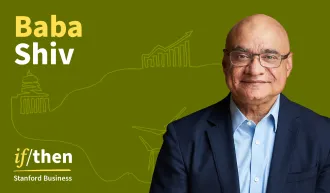William Barnett: Beware of VCs Who Claim to Know What’s Next
Most disruptive changes in markets are not predicted by experts.
January 12, 2015

The success of some VCs has created the mystique that they can predict the future. | Reuters/Jorge Dan Lopez
The guy at the table next to mine looks out at the amber sunset, puffs up with gravitas, and announces to his wide-eyed friend, “Soon, all things will be connected seamlessly to the ubiquitous network.”
It is time for me to change tables. I grab my drink and set off to find an area outside of Houdini’s vocal range. The bar here is cursed by its reputation as the place where venture capitalists from Silicon Valley’s Sand Hill Road meet. So, it attracts posers playing the prophet like Los Angeles attracts actors.
Coincidentally, on my way to the bar, I saw a hand-painted sign that read “clairvoyant conference” with an arrow pointing to a hotel. Imagine a conference for clairvoyants! You would not need to have sessions on future trends. But wait: Why the sign giving directions?
Since time began, it seems people want to believe that some of us have a special knowledge of what is to come. So we’re vulnerable to those who claim such knowledge — albeit different people fall for different images of the prophet. You might mock the trappings of the village shaman, the tarot reader, and the astrologist — but I bet you’d clear your calendar to hear the latest word from Silicon Valley’s richest VCs.
I’m not just waxing cynical. It turns out that venture capitalists typically are bad at predicting the future. As an industry, VCs don’t perform that well financially. To find VCs who outperform the market, you have to selectively sample only the most successful ones — but that is true for slot machines too. OK, a minority of VCs do tend to appear repeatedly on the winning side, so perhaps they are the real Houdinis. Or maybe, having been successful, they end up gaining preferential access to things that continue to make them successful. (I appreciate that advantage, working at Stanford.)
Whatever the reason, the fact that some VCs are repeatedly successful has created the mystique that there does exist, somewhere along Sand Hill Road, somebody who does know what’s next. Hence all the puffery at the bar.
Professor Elizabeth Pontikes of the University of Chicago Booth School of Business and I took a careful look at this question. We collected data on thousands of firms in the software business and looked at their fates over time — including both successes and failures in the data. We found that these firms herd into “hot” markets that have been blessed by the VCs. But we also found that the VCs herd into markets, too, following each other in financing frenzies. The resulting hype cycles lead to bad outcomes for companies; firms that receive funding in these waves are the least likely to ultimately succeed by going public. So much for Houdini.
Perhaps even more interesting is that the VCs themselves seem to be aware of this problem. While VCs herd into hot markets, at the same time they try to avoid investing in firms that do so. The VCs prefer instead to invest in those who pioneered what is now a hot market (and survived). As a kid, I had a precocious classmate who would jump to the front whenever he saw a trend, pointing resolutely forward in Napoleonic fashion, and commanding “follow me!” I’ll have to check; perhaps he grew up to be a VC.
Remember, the most disruptive changes are not predicted by our experts. They are pioneered by those foolish enough to ignore the consensus. Be skeptical of those who claim to know what’s next.
To learn more, read The Non-Consensus Entrepreneur: Organizational Responses to Vital Events by William P. Barnett and Elizabeth Pontikes.
William P. Barnett is the Thomas M. Siebel Professor of Business Leadership, Strategy, and Organizations at Stanford GSB and the co-director of the Executive Program in Strategy and Organization. This story was originally published on his blog, “Bill Barnett on Strategy.”
For media inquiries, visit the Newsroom.
Explore More

Get Ready for Season 4 of Grit & Growth

Short Takes: Trailblazing the Internet of Things in Bangladesh



